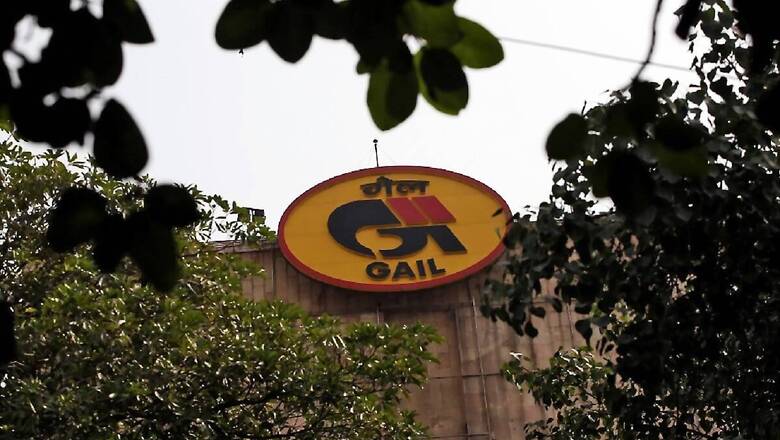
views
India may see the share of natural gas in its energy basket rise to 10 per cent by 2025 as a result of massive investment push in the creation of infrastructure to take the environment-friendly fuel to consumers, GAIL Director (Marketing) E S Ranganathan said on Friday. Currently, natural gas makes up about 6.2 per cent of the entire energy consumption in the country.
Prime Minister Narendra Modi has set a target of raising the share of natural gas in the energy basket to 15 per cent by 2030 to cut carbon emission in the economy. "With gas demand (growing at) CAGR (of) 8 per cent, gas is expected to account for around 10 per cent of India's primary energy supply by 2025," Ranganathan said at a PHDCCI webinar. CAGR stands for compound annual growth rate.
India is making investments worth billions of dollars to expand pipeline network as well as build import capacities to meet growing gas demand in the country. Also, city gas distribution networks are being expanded to raise the share of gas as a transportation fuel as well as kitchen fuel. Ranganathan said the government has over the past few years taken several policy measures to enhance exploration and production of oil and gas in the country including liberalised licensing regime and giving pricing and marketing freedoms.
"The number of reforms envisaged by the government will be instrumental in realising India's vision on mega investments on LNG (liquefied natural gas) terminals, gas pipelines and CGD infrastructure in a move towards increasing the share of natural gas from 6 per cent to 15 per cent in the energy basket," he said. Currently, the total natural gas pipeline network in India is about 17,500 km, of which 12,500 km is operated by GAIL.
"Developmental work of national gas grid is being carried out aggressively," he said adding that augmentation of the existing LNG import terminal capacity has been taken up. With the commissioning of two new liquefied natural gas (LNG) terminal (one in the east coast and another in the west coast of India), regasification capacity of India has reached 39 million tonnes per annum.
"This capacity is expected to cross 60 million tonnes in the coming years with another four greenfield LNG terminals which are currently under construction and planned expansion in Dabhol terminal," he said. There had been a huge thrust from the government on the development of the natural gas market in the eastern and northeastern regions in India, he said.
Ranganathan said the Indian gas market had taken an unprecedented hit from the recent COVID-19 pandemic crisis. "Impact on commercial, transportation, manufacturing, and industrial activities led to a substantial decline in overall gas consumption. With the unlocking measures, normalcy is expected in the major segments such as fertiliser, power, and refinery." The gas projects were delayed by the pandemic as work got hampered due to unavailability of manpower, labour, and raw material and sudden disruptions in the supply chains, he said. He also added that efforts were taken to revive the developmental pace and to bring the projects back on track. "Global natural gas markets have gone through a strong supply and trade adjustments, leading to historically low spot prices and high volatility.
"At this time when gas infrastructure is doubling, India is in a comfortable position to derive benefit from these low prices which have fallen 25 per cent. This might lead to reshaping consumer habits as gas becomes their go-to fuel," he said. Power and fertiliser sectors, he said, will continue to form the anchor consumer sectors for natural gas in India.
While renewable energy capacity is increasing rapidly, electricity grid stability can be provided by gas-based power plants that respond more swiftly on load changes than coal-based plants, making them suitable for the balancing role in providing grid stability. He said the contribution of gas in the transport sector stands at a mere 3.2 per cent in 2019, providing a huge potential for alternative fuels like natural gas and LNG to increase their share.
India has been the fourth largest importer of LNG in 2019 catering about 55 per cent of gas demand. "Various pilot projects are being launched to study the scope of LNG usage as a transport fuel focusing mainly in the heavy-duty trucking segment with long haulage and the commercial buses," he said.
The CGD sector is India's fastest-growing gas demand center as city gas net reached 407 districts in 2019-20, he said. "With the ongoing expansion of gas transmission networks, gas demand from industry is likely to rise. Gas consumption from the refinery sector is also expected to grow as refineries on the east coast will get connected through the planned expansion of transmission line, Ranganathan said.
He also added that new and innovative applications of gas are likely to emerge going ahead in areas like LNG for transport, tri-generation of power, heating and cooling for industrial and commercial loads, and small-scale LNG. Expansion of gas infrastructure and offering affordable supply will be the key to unlock the gas demand in India, he added.


















Comments
0 comment